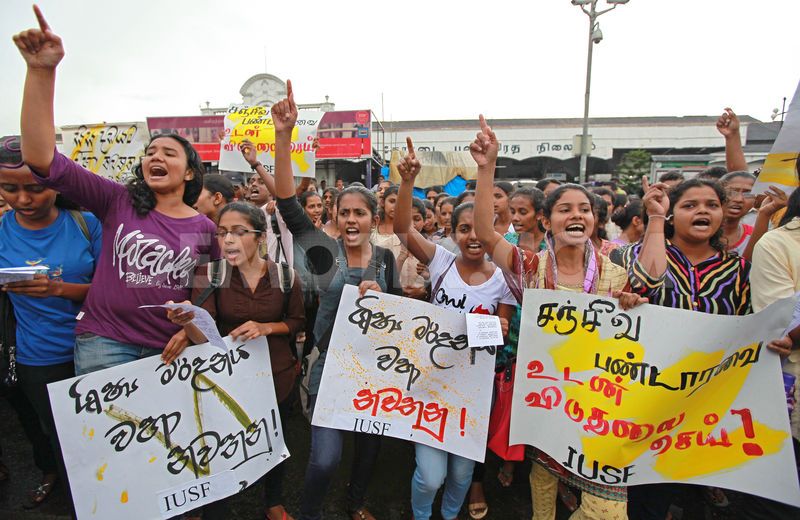[Inter-University Student Federation (IUSF) has been in the forefront of anti regime struggle]
The co-coordinator of the Marx School Sumanasiri Liyanage says that the Front Line Socialist Party (FSP) led social left front poses the real opposition to the Mahinda Rajapaksa regime both in its program and in its practice.
Mr. Liyanage has elaborated this opinion in an essay: ‘The Significance of FSP Candidacy in the Presidential Election’
SLB republish excerpts from the essay below.
Having been encouraged by the Syriza (Coalition of the Radical Left)experience in Greece, FSP tried hard to unite all left parties, groups and individuals to field a common candidate of the social left with a minimum but transitional left democratic program at the next presidential election. Well FSP does not claim that the left front it had initiated is Syriza in Sri Lanka; but it seems to me it is Syriza in the making. Whether it will mark a significant moment in Sri Lankan political history is yet to be seen. Nonetheless, this moment is and will become significant and relevant as FSP led social left in its manifesto have raised so many important questions that two principal contenders have refused so far to raise. Most importantly, when both fronts are ideologically dominated Sinhala-Buddhist (UPFA by Bodu Bala Sena and Maithree front by Jathika Hela Urumaya) elements, FSP left front appears to be the most effective secular political formation in the next election. Hence, my submission in this article is that the FSP led social left front poses the real opposition to the Mahinda Rajapaksa regime both in its program and in its practice.
Sri Lanka needs a strong social movement to counter three main trends in its recent history, namely, towards authoritarianism, towards economic policy framework that is biased towards the interests of the upper classes and layers of the society, and towards majoritarianism. Although these three trends emerged prior to MR coming to power, they have consolidated and strengthened under his regime due to multiple reasons.

What is relevant to my present submission is to look at the question of what social movements were actively engaged against the MR regime and its policies and actions. I recognize two counteracting forces in Sri Lankan society that questioned policies and actions of the MR regime. The first group, primarily urban, posed the issue of democracy, rule of law and good governance in their orthodox meanings. The most important group in this category was the Sri Lanka Lawyers’ Association that came forward strongly against the removal of the Chief justice, Dr Shirani Bandaranayaka. It organized many fora to discuss the matters that fell within its purview. Later, Citizen Forum also raised similar issues with strong political orientation. These views had been finally crystalized in the movement for Just Society led by Rev Maduluwave Sobhitha raising two main demands, (1) abolition of the executive presidential system and (2) reactivation of the 17th Amendment by repealing 18th Amendment to the Constitution. These protests by these groupings received so much attention by the media partly because of their elitist character.
The second opposition against the MR regime came from subaltern movements. There are four groups, (1) student movement; (2) trade unions and workers’ movements; (3) protests by peasants and rural masses; and (4) movements by numerically small nations and ethnic groups. Second and third movements were scattered and sporadic. The same can be applied to the fourth movement after militarily defeating the LTTE in 2009. Hence the consistent opposition to the government, especially against its policies on education, has been guided by the Inter-University Student Federation (IUSF). IUSF launched many a struggle in the recent past against cuts of student subsidies, educational reforms, commodification of education and so on. It is interesting and encouraging to note that IUSF was able to defeat government plans to reform education by encouraging private investments to enter into the field of education with the motive of profit. In the last year or so, it won almost all its struggles. The IUSF while struggling for free education also widened the democratic space that the elitist groupings failed to achieve. I remember very well when the march in Colombo city by the IUSF was banned by a court order at the request of the Police, Najith Indika, IUSF President decided to defy the order and continue the march. It proved to be a great victory. The following week, a district judge warned the police not to come forward with such requests. This, in my view, was a most significant victory for the democratic movement in Sri Lanka and all credit should go to IUSF.
The other subaltern movements that were capable of forcing the MR government to retreat include the anti-pension scheme by private sector employees in Free Trade Zone, peoples’ movement against water problem at Rathupaswala, protests by slum people against forcible eviction from their houses, peasants’ opposition to seed and water bills and micro opposition by villagers on their problems.
Maithripala Sirisena announcing his candidacy as a common opposition candidate informed us his program is limited to the abolition of the executive presidency and the reactivation of the 17th Amendment. In this sense his electoral program is based on the demands put forward by the elitist movement. There is no doubt that these are demands are important; but the program built on these demands are necessary but not sufficient to face or counter three major trends in Sri Lankans polity, society and economy. In contrast, FSP’s program is based on the struggles by various social elements in the past ten years taking issues raised by them in its entirety, in other words, confronting the MR candidacy by challenging it with a comprehensive program. Most significantly, the program includes swayan paalana by numerically small nations and protection of whatever the rights they have won, like 13th Amendment although they informed that they are not happy about it.
